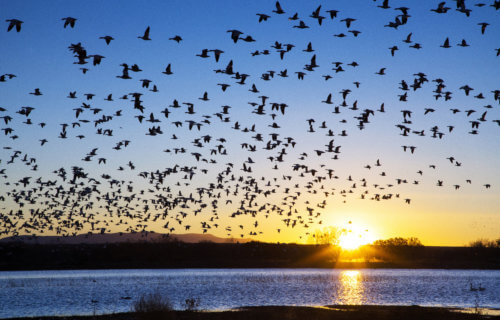DURHAM, England — There may be no better way to tell that winter is truly on its way than to see the annual journey to warmer climates for birds across the world. But could the marvelous event become a thing of the past? Climate change could bring the curtain down on spectacular bird migrations, according to new research.
Bird migrations are among the most thrilling sights in nature. Flocks can number in the millions, resembling a tornado. Many common varieties, including Nightingales and Willow Warblers, are already spending up to two months longer in winter breeding grounds.
They may eventually remain for good, scientists say. “If the trends continue, in time some birds will spend no time at all in sub-Saharan Africa — and instead spend the full year within Europe,” posits study lead author Kieran Lawrence, a a PhD student in the Department of Biosciences at Durham University, in a statement.
The most famous birds are long-distance migrants, such as swallows, which breed in Europe and spend the winter in Africa. At least 4,000 species are regular migrants — about 40% of the world’s total.
In far northern regions, such as Canada or Scandinavia, most birds move south to escape winter. In temperate areas like the U.K., about half the species migrate, including cuckoos, swifts, and other insect-eaters that can’t find enough food during the cold months. On the other hand, blackbirds usually found in gardens in January are often winter visitors from Eastern Europe.
“The changes in migratory habits we are already seeing could lead to longer breeding seasons for these species, as well as knock-on effects on other species, both here in the U.K. and in the traditional winter migration destinations. In Europe, the longer presence of traditionally migratory birds could lead to increased competition for autumn/winter food and resources for resident bird species that do not migrate,” says Lawrence. “Meanwhile, in the traditional migration destinations of sub-Saharan Africa, a reduction in the time migratory birds spend there could have implications for ecosystem services such as insect consumption, seed dispersal, and pollination.”
The study shows trans-Saharan migratory birds are spending as many as 50 to 60 fewer days a year in their non-breeding grounds in Africa. It’s based on over 50 years of bird-sighting data from traditional retreats in the African country, The Gambia, and Gibraltar on Spain’s South Coast. The significant reduction suggests they are able to survive longer in Europe than before.
Migration treks involve round trips of at least 10,000 miles. Some may stop making them for good, the authors say. It was previously thought birds were able to time them through changes in day length. But the findings suggest they are making more nuanced decisions — responding to global warming and available vegetation.
The study found that birds were now arriving at their winter destinations later into the fall than before. They were also departing the locations earlier in the spring, slashing the overall period in non-breeding grounds.
“Next, we aim to apply a new model, which we are developing at Durham, to simulate these complex migrations, and which we can then apply to future scenarios to understand how the patterns we have identified in trans-Saharan birds over recent decades may continue or change,” said project leader Professor Stephen Willis.
Records were gathered by ornithologists in The Gambia and Gibraltar between 1964 and 2019 and 1991 and 2018, respectively. They enabled the researchers to explore changes in arrival and departure and relate them to environmental factors.
“It is very satisfying to see the constructive way the Gambian migrant bird records, collected by dedicated ornithologists over many decades, are now being used to highlight the changing migratory patterns of these species. Until the current research, no-one had realized the extent to which migrant birds are spending less of the year in sub-Saharan Africa,” added co-author Clive Barlow, who has lived in The Gambia since 1985, where he runs bird-watching safaris.
In tropical regions, such as the Amazon rainforest, fewer species migrate, since the weather and food supply there are more reliable all year round.
The study is published in the journal Global Change Biology.
South West News Service writer Mark Waghorn contributed to this report.
